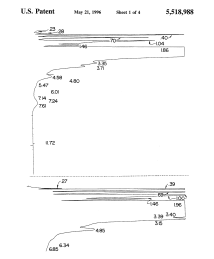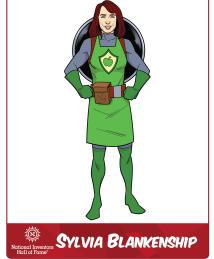Sylvia Blankenship
"I think that the ability to share ideas and talk through things when you have very different perspectives makes a huge ability to come up with ideas that maybe wouldn’t have surfaced otherwise."
Horticulturalist Sylvia Blankenship and biochemist Edward Sisler identified 1-methylcyclopropene (1- MCP), a novel compound that significantly extends the freshness and storage life of fruits, vegetables and cut floral products by mitigating the effects of ethylene.
Blankenship grew up in northern Virginia and spent summers on her family’s ranch in Texas, developing an appreciation for nature as she explored the woods and gardened with her mother.
She was drawn to studying horticulture and wanted to pursue a career connected to the outdoors. In an interview with the National Inventors Hall of Fame®, she said, “I was becoming more and more interested in how plants and flowers grew, and why they did certain things under certain conditions outside and inside the greenhouse.”
Blankenship earned her bachelor’s and master’s degrees in horticulture science at Texas A&M University in 1977 and 1979. In 1983, she graduated with her doctorate from Oregon State University, where she made the transition from studying ornamentals to focusing on food horticulture.
She took a teaching and research position at North Carolina State University (NCSU) in 1983 and began working with apple growers, gaining insight into the challenges of delivering quality produce.
Blankenship met her co-inventor and fellow Hall of Famer Edward Sisler, a biochemist, on the NCSU campus. She visited his lab and observed his work with ethylene — a small, naturally occurring hydrocarbon gas that stimulates plant development and fruit ripening by docking in plant cell receptor sites. To stall these chemical processes, something else must take the place of ethylene in the receptor sites.
The two began working together on experiments and received a Department of Agriculture grant to identify an ethylene receptor. They found the answer in their development of 1-MCP, a compound that docks in plant cell receptor sites, blocking ethylene and altering the signals that drive cellular processes.
This discovery drastically changed the floral and fruit industries, contributing to major reductions in food waste and enabling year-round access to fresh fruit.
The 1-MCP compound was patented in 1996 and soon after, it was licensed by Floralife as EthylBloc™ for floral crops. In 1999, AgroFresh was formed to commercialize 1-MCP for fruits and vegetables. The product SmartFresh™ was approved by the Environmental Protection Agency and introduced in 2002.
Today, SmartFresh is used on more than 30 crops, including 50 to 70% of the apples harvested in the United States. Licensing fees for 1-MCP have brought in more than $25 million for NCSU, the highest royalty revenues in the school’s history.
“One of the biggest pleasures that I have is when an apple grower says, ‘You helped my business. You saved my business. You changed the way I do business.’ It's so heartwarming, and I am so glad that they benefited from it,” said Blankenship.
The positive impact of her work extends to consumers as well. “They have a better-quality product in the end,” she said. “They have something that's going to last longer.”
Blankenship, who holds two U.S. patents and has received multiple awards for her work, is currently professor emerita and senior associate dean at NCSU. To encourage young innovators, she has served as a Judge in the Collegiate Inventors Competition® and visited with children participating in Camp Invention® to share lessons she has learned through her own lifelong exploration of nature and science.




